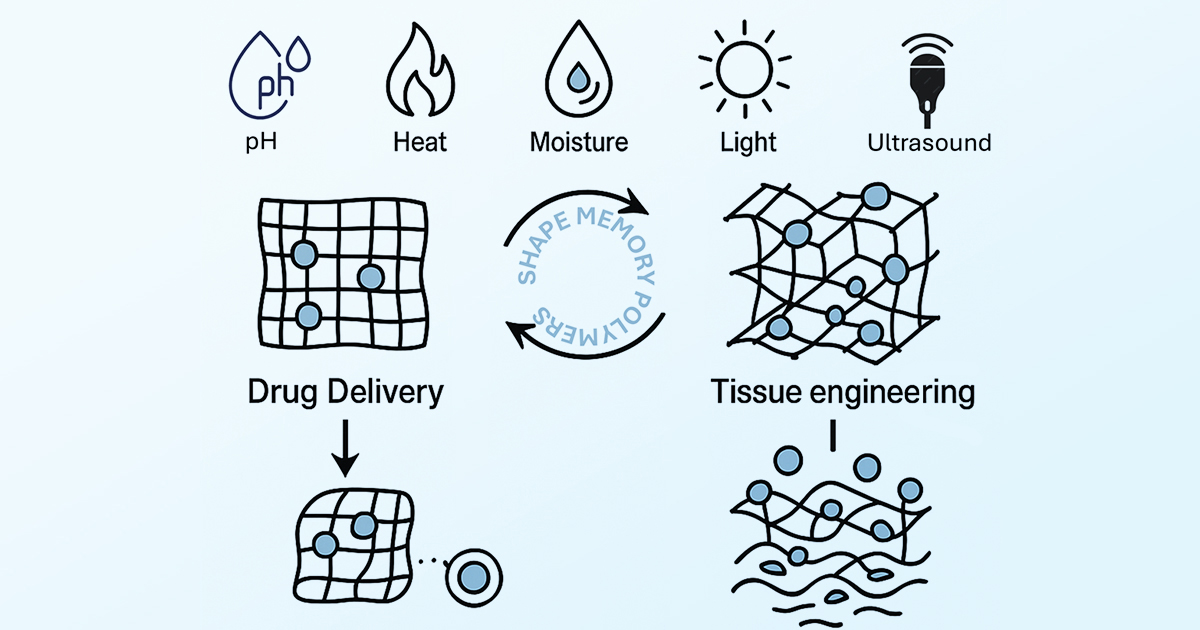Shape Memory Polymers for Drug Delivery and Tissue Engineering
A special issue of Pharmaceutics (ISSN 1999-4923). This special issue belongs to the section "Drug Delivery and Controlled Release".
Deadline for manuscript submissions: 31 March 2026 | Viewed by 120

Special Issue Editor
Interests: drug delivery; tissue engineering; shape memory polymers; nanotechnology
Special Issues, Collections and Topics in MDPI journals
Special Issue Information
Dear Colleagues,
Shape memory polymers (SMPs) represent a highly versatile class of smart materials with unique capabilities to undergo programmed shape changes in response to external stimuli such as heat, pH, light, moisture, and ultrasound. Their tunable mechanical properties, biocompatibility, and biodegradability make them especially attractive for applications at the interface of medicine, materials science, and biotechnology. This Special Issue focuses on highlighting emerging advances in the design, fabrication, and application of SMPs for drug delivery and tissue engineering.
In drug delivery, SMPs enable the development of responsive carriers that can be deployed in minimally invasive forms and activated in situ to release therapeutics with high spatiotemporal precision. Examples include temperature-triggered micro- and nanocarriers, implantable scaffolds that open or contract to release drugs, and pH-sensitive systems tailored for gastrointestinal or tumor-targeted delivery. The potential to integrate SMPs with other stimuli-responsive chemistries further broadens their applicability for personalized medicine.
In tissue engineering, SMPs provide scaffolding materials with dynamic properties that effectively mimic the natural extracellular matrix. Their ability to change shape and stiffness allows for novel strategies in guided tissue regeneration, wound healing, and organ repair. SMP-based scaffolds can be deployed in compact configurations and then expanded within the body, reducing surgical invasiveness. Moreover, 3D-printed SMP structures offer unprecedented control over architecture, enabling tissue-specific design and functional integration.
This Special Issue will collect cutting-edge contributions addressing fundamental design principles, fabrication technologies, biological interactions, and translational applications of SMPs. By uniting perspectives from polymer chemistry, bioengineering, and clinical science, the issue seeks to accelerate the development of next-generation SMP-based systems, which can transform drug delivery and tissue regeneration strategies.
Dr. Silvia Pisani
Guest Editor
Manuscript Submission Information
Manuscripts should be submitted online at www.mdpi.com by registering and logging in to this website. Once you are registered, click here to go to the submission form. Manuscripts can be submitted until the deadline. All submissions that pass pre-check are peer-reviewed. Accepted papers will be published continuously in the journal (as soon as accepted) and will be listed together on the special issue website. Research articles, review articles as well as short communications are invited. For planned papers, a title and short abstract (about 250 words) can be sent to the Editorial Office for assessment.
Submitted manuscripts should not have been published previously, nor be under consideration for publication elsewhere (except conference proceedings papers). All manuscripts are thoroughly refereed through a single-blind peer-review process. A guide for authors and other relevant information for submission of manuscripts is available on the Instructions for Authors page. Pharmaceutics is an international peer-reviewed open access monthly journal published by MDPI.
Please visit the Instructions for Authors page before submitting a manuscript. The Article Processing Charge (APC) for publication in this open access journal is 2900 CHF (Swiss Francs). Submitted papers should be well formatted and use good English. Authors may use MDPI's English editing service prior to publication or during author revisions.
Keywords
- shape memory polymers
- smart biomaterials
- drug delivery system
- tissue engineering
- regenerative medicine
- controlled release
- biomedical applications
- electrospinning
- 3D printing
- microfluidic
Benefits of Publishing in a Special Issue
- Ease of navigation: Grouping papers by topic helps scholars navigate broad scope journals more efficiently.
- Greater discoverability: Special Issues support the reach and impact of scientific research. Articles in Special Issues are more discoverable and cited more frequently.
- Expansion of research network: Special Issues facilitate connections among authors, fostering scientific collaborations.
- External promotion: Articles in Special Issues are often promoted through the journal's social media, increasing their visibility.
- Reprint: MDPI Books provides the opportunity to republish successful Special Issues in book format, both online and in print.
Further information on MDPI's Special Issue policies can be found here.






